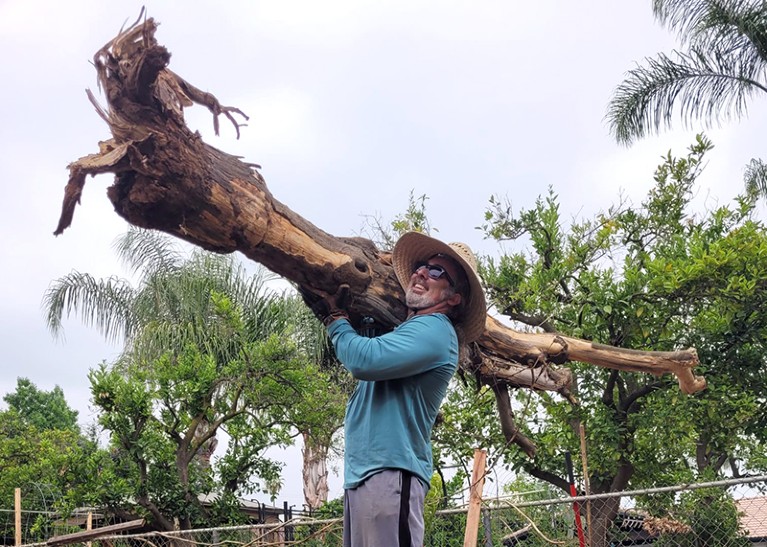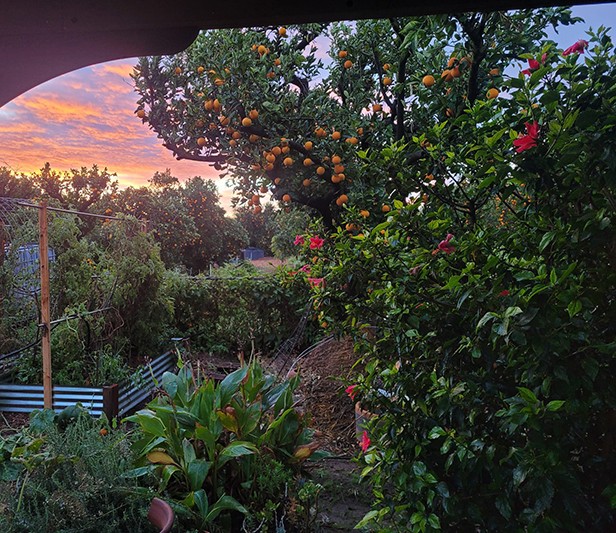
During his sabbatical, Brandon Brown spent a lot of time in nature. His personal growth helped him to clarify what he wanted out of academia.Credit: Brandon Brown
Friends and family members often ask why I’m up late on weekends or holidays, working on manuscripts, lectures and presentations, grant applications, organizing community events and the task that is most time consuming of all, answering e-mails.
This work–life imbalance is familiar to many — or perhaps most — in academia. There is always another grant application to write, paper to publish or excellent student to mentor.
After hearing about other academics taking sabbaticals, I wanted to learn more about how they did so, and began wondering whether I could take one. I’m based at the medical school at the University of California (UC), Riverside, and my colleagues in the academic-affairs office told me that a sabbatical could be a good opportunity to pause my teaching and academic service obligations and pursue new lines of research. They asked me how many ‘sabbatical credits’ I had, which would determine the amount of time off that I could take. I had no idea what those were, but was shown how to access them in the university’s online portal.
A senior colleague outside my department told me that I would need to write an application explaining what I planned to do while away, before securing approvals from my department chair, the school of medicine’s dean and the university chancellor. When I returned to my post, I would need to submit a report on how I had spent my time (my institutional guidelines are available here), to see whether my activities matched up with what I had planned to do.
I have worked full-time in the UC system for about 12 years, and was thrilled to learn that I had earned about 9 months of credits, and that I would continue to receive my full salary during my sabbatical. I could travel abroad or to a different state, or stay local — whatever worked best for me.
The thought of pursuing a sabbatical was daunting, not only because it’s uncommon among medical-school faculty — and I had no colleagues in my department who could offer a frame of reference — but also because I thought that others wouldn’t be able to take on many of my tasks.
Learning to step away
Table of Contents
I wondered who would teach my public-health courses, be the school of medicine’s equity adviser or mentor my students. I also have leadership roles in the Louis Stokes Alliance for Minority Participation programme at UC Riverside (the California programme is known as CAMP), which funds faculty-mentored research for students from under-represented racial and ethnic groups, and TruEvolution, a non-profit organization in Riverside that fights for health equity and racial justice to improve the lives of LGBT+ people. Who would lead these groups when I was gone? Would my institutional review board have enough members to meet and vote on items? Would I still be involved in my department’s hiring process? How would I manage my grants and other projects?
I enjoyed many of these activities and felt that I was crucial to their success. I continued my leadership role in CAMP and TruEvolution while I was away, but not the duties usually assigned to me by my departmental and school administrators.

Brown tended to his orchard during his time away.Credit: Brandon Brown
Going over my tasks and deciding which ones I was less passionate about was itself a motivator to press pause on my academic career. I applied for a sabbatical to focus on completing research projects, creating undergraduate and graduate courses and writing articles to help other academics navigate research and the tenure-track process. This plan was approved, and I started a six-month sabbatical on 2 January 2023.
At first, I did not know what to do with myself. Before I took time off, I would wake up at 4.30 a.m., check my e-mails for any urgent business that needed immediate attention and then start the rest of my work — which meant creating presentations, analysing data, revising manuscripts and preparing notes for the day’s meetings. But that routine no longer existed, and I realized that so much of my sense of self and my day-to-day life was grounded in academia. Instead, I was left with time. I used it to take a breath and rest.
I slept in, often until 6 or 6.30 a.m., and spent time outside in nature. I would have dinner with my family at 5 p.m., instead of eating at my desk, and could relax because I wasn’t working 14 hours a day or over the weekends. I had time to reflect on my role in academia, and thought about which activities could continue without me. I realized that academics work in a bubble of scholarly activities, and are often out of touch with the real world.
I also had the chance to remember why I got into academia in the first place — which reinvigorated me. Like many of my colleagues, I was the first in my family to attend university, and I have faced challenges while navigating academia as a Latino and first-generation scholar. I wouldn’t be where I am in my career without a community of people who helped me to succeed. As a senior faculty member, I am most fulfilled by helping young science students from under-represented groups to navigate the system, which is largely unchanged from when I was an applied-mathematics undergraduate student at UC Irvine in 1999.
Lessons learnt
The first lesson I learnt was that I am replaceable. I saw that some of my major contributions to my institution could easily be done by others. When I told people that I was away, many asked who was covering my responsibilities for, say, mentoring researchers, advising on diversity, equity and inclusion issues or leading a course.
I was tempted to simply ignore those questions and go fully ‘off grid’, but I did refer people to trusted colleagues. This reminded me that, if I am hit by a bus today, tomorrow someone else will take over my activities — which is a good thing. If scientists plan correctly, our research, teaching and mentoring can all continue when we are gone. It’s not worth risking ill health and losing years of life working long hours and on weekends and holidays just to complete tasks that aren’t emergencies and can be covered by others.
Another lesson: academia is just a bubble in the real world. When I spent more time with people outside academia, such as my mother, childhood friends, local farmers and community leaders, I had to practise my communication skills and real-world thinking. Instead of coming up with HIV interventions, resubmitting a revised article, forming a search committee for a faculty position, ordering laboratory supplies or reserving materials for a course, I found myself discussing nature, food, climate change, health care, retirement, media and technology. Once I returned to academia, I could navigate topics outside science tactfully. Not all conversations need be centred around scientific research and production. For instance, I am now more active in my leadership role at TruEvolution after having dedicated more time to it while away from UC Riverside.
Why academia?
During my sabbatical, I pondered the question of why I got into academia in the first place. I’m in academia to make a positive difference in the lives of students, and to diversify the face of STEM leadership. I still worked on this while away, but I planned on how to do better when I returned. It was only with my time off I had the head space to do so. I hired an administrator for CAMP after resuming work, and secured an office for the programme and its participants to call home.
This growth took time — which I had, because I took the sabbatical. Now, CAMP students have the space to meet, learn, practise giving presentations, support each other and prepare for graduate school. I succeeded as an academic because others had provided these resources to me. I wanted to give back — which was why I got involved in academia in the first place.
My sabbatical reminded me that academia is not always a welcoming or nurturing environment for faculty, for minoritized faculty, students and staff, particularly people of colour. We who are part of this system need to change it from within, and my sabbatical gave me the space to think about how to do so in a small way, and to help others navigate academia through my experience.
